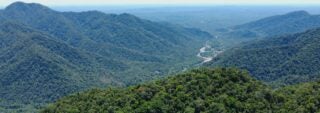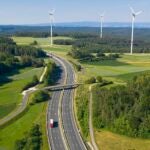- Resources
- Time to double down on high-confidence nature investments for climate and resilience
Resources
Time to double down on high-confidence nature investments for climate and resilience
Published: March 21, 2024 by Elizabeth Sturcken
Corporate investment in nature is critical to close ecosystem financing gaps and contribute to global net zero goals. The stakes are clear: roughly half the world’s GDP is at risk due to nature loss. Protecting and regenerating nature has emerged as an urgent priority for both supply chain resiliency and net zero goals alike. To achieve global climate goals, we need to nearly triple financing in nature to utilize its potential to mitigate climate change and we need to leverage all the tools we have available to do so.
The voluntary carbon market is a leading tool to channel finance from businesses to high-value and urgent investments in ecosystems and communities, allowing the private sector to achieve rapid near-term impacts alongside their internal reductions and science-based net zero pathways. Yet budgets are limited, and to slow warming at scale, businesses need to focus their investments on the highest-impact nature investments. And not all nature-based climate solutions are equally effective.
A new peer-reviewed study from Environmental Defense Fund and partners shines new light on this challenge. This study, based on research conducted by 27 scientists at 11 institutions including Environmental Defense Fund, The Nature Conservancy (TNC), and Columbia University, assessed whether 43 nature-based climate-solutions (NbCS) are based on sufficiently strong scientific evidence to support solutions like high-quality carbon crediting.
This research finds that four key forest-based climate solutions ‘lead the pack’ in certainty of climate benefits: tropical and temperate forest conservation and reforestation. There is lower confidence in the other 39 NbCS regarding quantification of their climate potential, and additional focused research is needed to build scientific confidence in our ability to quantify their greenhouse gas mitigation.
It is important to note that this research focuses entirely on the scientific underpinnings of these nature-based climate solutions – not how they are implemented via carbon crediting programs or other mechanisms. Strong underlying science about quantification alone is not enough to ensure that climate benefits are realized. Implementation must also follow best practices to realize those outcomes.
There are four key takeaways for business:
1. Businesses should double down on investments in nature-based climate solutions where we have the greatest scientific certainty – like in conservation and reforestation of tropical and temperate forests. These high-confidence solutions are especially important when they underpin corporate sustainability claims. For instance, strong confidence in quantification is most critical if companies are using NbCS credits to underpin offsetting-related claims like “carbon neutral” and “net zero”. Resources like the Tropical Forest Credit Integrity Guide, developed by EDF and leading NGO, research, and Indigenous Peoples and local communities (IPLC) partners, can further help businesses identify high-impact NbCS crediting options from tropical forests with benefits for people and the planet.
The findings of this paper are especially encouraging given the extreme urgency of protecting and restoring tropical forests, the increasing availability of solutions companies can use to support their conservation, and the scrutiny that the voluntary carbon market is under. Significant progress is being made in delivering high-quality tropical forest credits in the wake of heightened criticism of the voluntary carbon market and some types of tropical forest carbon credits last year. These advances include the increasing availability of high-integrity large-scale forest conservation (i.e., JREDD+) credits, which use the type of nature-based climate solutions this study confirms to have strong scientific foundations.
2. Quantification of the climate benefits of the remaining 39 nature-based climate solutions evaluated is still uncertain, and businesses should be cautious around the use and claims of these NbCS. However, as the science develops for this set of nature-based climate solutions, we should not let our foot off the accelerator on providing financing for most of these pathways through mechanisms other than crediting like government conservation programs and corporate sustainability initiatives.
While the scientific certainty in our ability to quantify these reductions and removals is lower, there are many other reasons to invest in these practices, such as improved soil health and reduced climate risks, and EDF encourages companies to continue driving these investments while being cautious about quantifying climate impacts as the science improves.
Yet this lack of scientific certainty creates risks that need to be managed if companies choose to use these NbCS pathways in carbon credit portfolios or for related claims. If a company invests in NbCS where we don’t yet have strong certainty in the quantification of outcomes for the purposes of climate claims, that company should understand that the scientific underpinning for the quantification of that outcome is weaker, and therefore comes with risks. These risks related to the underlying climate accounting can potentially translate into reputational risk for a company. It is critical to transparently communicate this risk and work to address it as science improves.
3. There are important reasons businesses should invest in nature.
For example, investments in nature can be valuable to companies’ resilience – in their value chains, operations, and broader operating environment, particularly for companies in the food, land, and agriculture sectors that rely heavily on natural capital. Investments can also create other positive environmental and social outcomes, support the Indigenous and local communities who are the best stewards of our environment yet are most at risk from climate change, and address the twin crises of climate change and biodiversity loss.
4. Implementation matters. While scientific confidence in quantifying climate benefits is a critical foundation for NbCS, how these projects and programs are implemented ultimately determines their overall impact.
Recent criticism has drawn attention to NbCS crediting projects where promised social or environmental benefits have not been realized, generally due to poor implementation. We must continue to elevate the quality of carbon credits and the voluntary carbon market if they are to play their needed roles in tackling climate change.
Businesses can play an active part in moving markets toward high-integrity approaches. Companies investing in NbCS via carbon credits must undertake robust due diligence to ensure projects or programs follow the best available science for implementation and meet key environmental and social quality criteria.
Initiatives like the Integrity Council for Voluntary Carbon Markets (ICVCM) will soon provide a standardized quality threshold for credits in the voluntary carbon market. Businesses can further leverage tools like the Carbon Credit Quality Initiative, a project of EDF, World Wildlife Fund, and Oeko-Institut that provides transparent information on the quality of carbon credits, to evaluate the environmental and social integrity of credits they purchase, and resources like the Tropical Forest Credity Integrity Guide. EDF’s Net Zero Action Accelerator includes additional webinar trainings, guides, and resources for businesses looking to leverage nature-based climate solutions and the voluntary carbon market in their sustainability strategies.
The message is clear: Companies must continue to ramp up investment in nature for climate, ecosystem, biodiversity and community benefits. Science can guide us to those efforts where there is the highest-confidence in terms of climate outcomes. And more research is needed to understand the climate impact of the multitude of critical nature investments that we need for a thriving planet.
Related Explainers:


